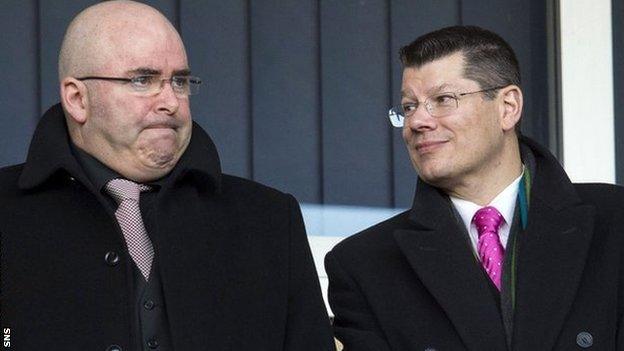SPFL & Scottish FA: Having no fans is 'political, rather than clinical'
- Published

The Scottish FA's Mike Mulraney, left, and Neil Doncaster of the SPFL voice their frustration at the Scottish government's stance
The delay in allowing fans to return to stadiums in Scotland is "political, rather than clinical", say two of the country's top football administrators.
Scottish FA vice-president Mike Mulraney made the claim on BBC Radio Scotland - and was supported by SPFL chief executive Neil Doncaster.
Mulraney said it is "fair to ask the Scottish government to reconsider" its stance on playing in empty stadiums.
"I listen to the science and it does seem counter-intuitive," he said.
"I think it is driven by science, but do you think that sitting one metre away from somebody eating in a restaurant has less risk than sitting two metres away from someone in a stadium with a mask on?"
Doncaster will discuss the matter with sports minister Joe Fitzpatrick on Monday and said that "it often feels football does not get a fair rub of the green".
"The UK Government does not allow fans into Premier League or EFL grounds in the fresh air," he said. "But the Royal Albert Hall has now been allowed to admit 57% of capacity in an indoor venue.
"Anybody who tells me that is not a political choice, I'm sorry I don't accept that."
Responding to the claims, national clinical director Professor Jason Leitch told BBC Scotland: "It's absolutely not a political decision, he's incorrect.
"It's a choice made by the clinicians and then the decision makers choose. You simply cannot re-open everything."
'No negative feedback to test events'
It had been hoped fans would be allowed into stadiums in Scotland from 14 September, but that indicative date has been pushed back to 5 October at the earliest due to a rise in Covid-19 cases.
Mulraney recognised the difficulties faced by the government but pointed out that Prof Leitch recently said "allowing 600 fans into a stadium that holds 60,000 outside, all facing the same way, is probably far less risky than letting people into a restaurant or an aeroplane".
The Scottish government did permit Ross County and Aberdeen to hold test events in September with 300 fans and Doncaster said there "has been no negative feedback".
However, any further matches with small spectator numbers have been put on hold.
He added: "The clubs made it entirely clear they could have accommodated many more in absolute safety on a socially-distanced basis."
A report last year discovered that 43% of Scottish football's income comes from gate receipts - the highest percentage of any league in Europe.
And, pointing to financial support given to the National League in England and to rugby league, Doncaster was cautiously optimistic that Scottish football could also get help.
"That gives me a bit of confidence," he said. "The UK government is effectively putting new money into sport in England so around 10% of that should make its way to the Scottish government.
"We have a meeting on Monday and are hoping very much to receive good news on financial support.
"Without meaningful support from government, there will be significant numbers of clubs across Scotland in real danger of being lost forever."
A Scottish Government spokesperson said they "recognise this has been an enormously challenging time for football" and that they "will continue to work closely" with the football authorities.
"We are also awaiting clarity on whether there will be consequentials arising from UK Government funding," they added.